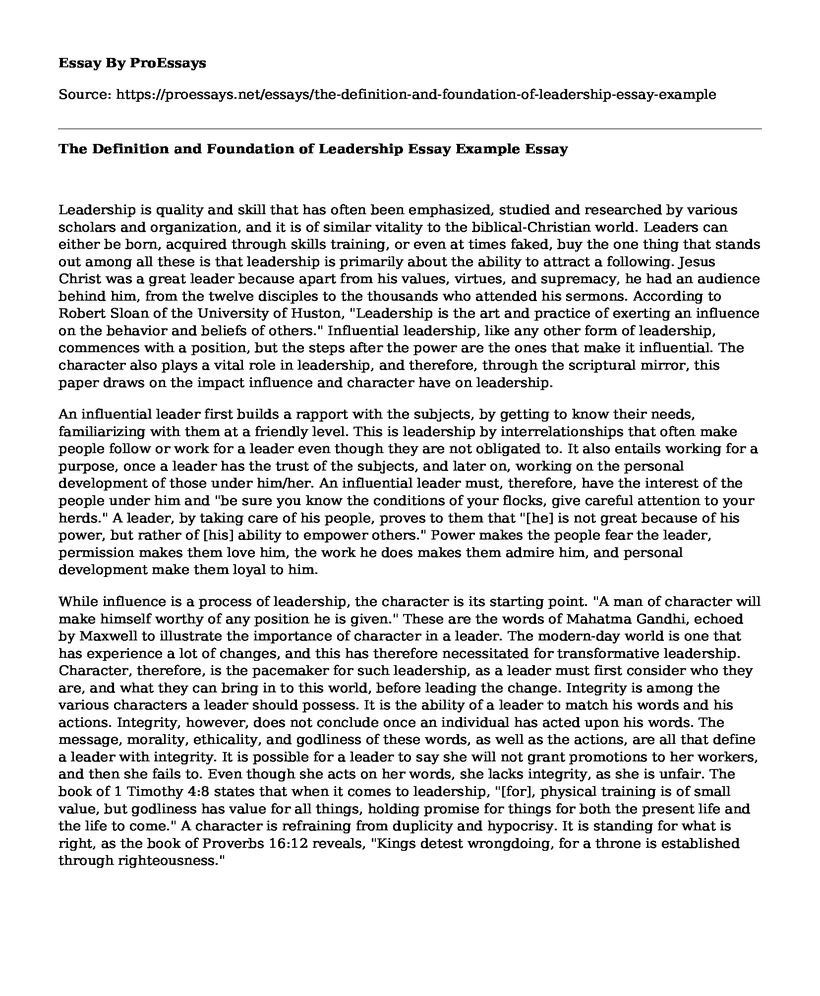Leadership is quality and skill that has often been emphasized, studied and researched by various scholars and organization, and it is of similar vitality to the biblical-Christian world. Leaders can either be born, acquired through skills training, or even at times faked, buy the one thing that stands out among all these is that leadership is primarily about the ability to attract a following. Jesus Christ was a great leader because apart from his values, virtues, and supremacy, he had an audience behind him, from the twelve disciples to the thousands who attended his sermons. According to Robert Sloan of the University of Huston, "Leadership is the art and practice of exerting an influence on the behavior and beliefs of others." Influential leadership, like any other form of leadership, commences with a position, but the steps after the power are the ones that make it influential. The character also plays a vital role in leadership, and therefore, through the scriptural mirror, this paper draws on the impact influence and character have on leadership.
An influential leader first builds a rapport with the subjects, by getting to know their needs, familiarizing with them at a friendly level. This is leadership by interrelationships that often make people follow or work for a leader even though they are not obligated to. It also entails working for a purpose, once a leader has the trust of the subjects, and later on, working on the personal development of those under him/her. An influential leader must, therefore, have the interest of the people under him and "be sure you know the conditions of your flocks, give careful attention to your herds." A leader, by taking care of his people, proves to them that "[he] is not great because of his power, but rather of [his] ability to empower others." Power makes the people fear the leader, permission makes them love him, the work he does makes them admire him, and personal development make them loyal to him.
While influence is a process of leadership, the character is its starting point. "A man of character will make himself worthy of any position he is given." These are the words of Mahatma Gandhi, echoed by Maxwell to illustrate the importance of character in a leader. The modern-day world is one that has experience a lot of changes, and this has therefore necessitated for transformative leadership. Character, therefore, is the pacemaker for such leadership, as a leader must first consider who they are, and what they can bring in to this world, before leading the change. Integrity is among the various characters a leader should possess. It is the ability of a leader to match his words and his actions. Integrity, however, does not conclude once an individual has acted upon his words. The message, morality, ethicality, and godliness of these words, as well as the actions, are all that define a leader with integrity. It is possible for a leader to say she will not grant promotions to her workers, and then she fails to. Even though she acts on her words, she lacks integrity, as she is unfair. The book of 1 Timothy 4:8 states that when it comes to leadership, "[for], physical training is of small value, but godliness has value for all things, holding promise for things for both the present life and the life to come." A character is refraining from duplicity and hypocrisy. It is standing for what is right, as the book of Proverbs 16:12 reveals, "Kings detest wrongdoing, for a throne is established through righteousness."
Conclusion
Leaders often define the societies and organizations they lead, and this is why it is crucial to have leaders who have positive impacts on the people they lead. A lot of adjectives and words have been used to describe the ideal leader, but two words are sufficient to do this; influence and integrity. Having a following, and leading them through the right path is what leadership entails. Therefore by combining servant leadership, influence and character, the church and the world will see better days ahead.
Bibliography
Maxwell J.C. Developing the leader within you 2.0. Thomas Nelson Inc. publishers. 2018. Pp. 1-48
Sloan R. B. The biblical model of leadership. The Huston Baptist University. Chapter 1. Pp. 8-23
Cite this page
The Definition and Foundation of Leadership Essay Example. (2022, Dec 10). Retrieved from https://proessays.net/essays/the-definition-and-foundation-of-leadership-essay-example
If you are the original author of this essay and no longer wish to have it published on the ProEssays website, please click below to request its removal:
- Questions on Management Concepts
- Paper Example on Leadership Preparedness among Schoolchildren in Abu Dhabi
- Communication Mechanisms That Can Be Adopted by Dean and Top Management
- Paper Example on Growth Stage
- Reflection on Leadership Experiences and Role Models Paper Example
- Essay Sample on Reforming Business Organizations: The Zendesk Model vs. Henri Fayol's Five Pillars
- Annotated Bibliography Example on Schools Evolving: Adapting to the Changing Workplace Environment







